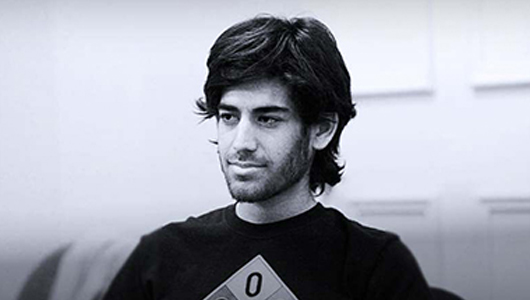I have opened The Boy Who Could Change the World by Aaron Swartz not really knowing what to expect, to my own shame, I will be the first one to admit. RSS, Reddit, Wikipedia, Markdown – were all things familiar to me, some of them I use on the daily basis. But I was only very faintly aware of Aaron’s involvement in them. Aaron was a programmer, writer and entrepreneur. A passionate activist, his work questioned assumptions of intellectual property and shaped the internet in many ways, some of which we don’t even realize. He has committed a suicide at the age of twenty-six while being prosecuted of downloading materials from JSTOR. The Boy Who Could Change the World has been completed and released posthumously.
• Author: Aaron Swartz (Introduction by Lawrence Lessig)
• Publisher: Verso
• Release Date: Available Now
• Format review on: Paperback

The book is the collection of the blog posts and lectures written by Aaron, which are divided into sections like Free Culture, Politics and Media, Computers, and more. Each section contains series of essay by Aaron of these topics with forewords by those who knew him and his work. The writing spans from when Aaron was a teenager until just before his death in 2013. It is instantly flooring how intelligent and well written the posts are. If the age, during which Aaron has written the post, was not stated at the beginning of each post, I would have never believed anyone to be deliberating these topics with such depth and understanding. Some blogs posts were written by him as young as fifteen years old.
I will not be judging the contents of Aaron’s post. Aaron Swartz was more intelligent than me and with better understanding of topics discussed than I can ever have. Internet and programming were not just his work, they were his passion. I am only lucky enough to enjoy some of the results of his hard work and appreciate his thoughts on the matter. I think they are a fascinating read and I wish I had a better interest and understanding of the internet culture and politics to be able to appreciate it better. Nonetheless, reading this book encouraged me to delve into researching and considering topic previously completely off my radar, and that is a great testament to Aaron’s great writing.
However, what I can judge, especially as a reader, with a rather mainstream knowledge of subjects discussed, is how good the editing was at helping me to ‘connect the dots’. The answer is – not very good. While the book is divided into various sections, and all the essay have clearly been picked for very specific reasons, reading through the entries is very disorienting. Those who followed Aaron’s blog, where most of the entries were originally posted, would have a better background to understand where Aaron was coming from in his thinking. They would be aware of the event happening in the background that generated thought ‘A’ and that post ‘B’ was a rebuttal to a user comment in post ‘A’, for example. They would also see Aaron’s thoughts develop chronologically, as he got older, learnt and understood more.

The readers of the book have been devoid of all of that. While each post has a corresponding date, unless there is an acute awareness of the atmosphere of the internet community and world politics at the time, it is hard to orient yourself with what Aaron is talking about. Almost every new post is a jump in time from Aaron at twenty-two to Aaron at nineteen, and then to Aaron at twenty-four. So even when you think you got your bearings right, the next page transports you into a new confusing territory again. Beyond that, what if the reader doesn’t know who Aaron is? What motivated him? Why did he care and speak so passionately about those things in his post? Well, that reader might as well continue wondering. Or check Wikipedia. I had to.
Interestingly enough, in his introduction to the book, Lawrence Lessig wonders about almost the same point I have raised. Lawrence had recounted Aaron’s post to some of his friends at Stanford Law School, making Aaron upset. ‘That was private.’ Aaron explained. It was not private in a sense that no one was allowed to speak about it, the post was published on the internet, after all. It was private because it was for those who followed Aaron’s blog, to a random then listener or now, reader. That’s exactly how I feel. I am a ransomer, reading this book, and I cannot appreciate it fully, although I wish I could.
It is hard for me to recommend the The Boy Who Could Change The World. Not because I don’t think the contents of the book are unimportant or uninteresting, but plainly because I am not sure how many people will ‘get it’. This is a book for the ‘insiders’, for those who know exactly what Aaron is talking about. If you are, like me, even slightly on the outside, the book will not help or guide you through it.

